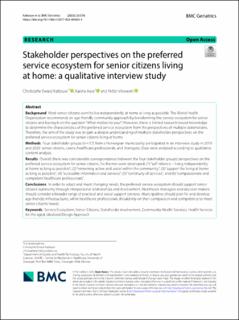| dc.contributor.author | Kattouw, Christophe Eward | |
| dc.contributor.author | Aase, Karina | |
| dc.contributor.author | Viksveen, Petter | |
| dc.date.accessioned | 2023-10-12T09:05:17Z | |
| dc.date.available | 2023-10-12T09:05:17Z | |
| dc.date.created | 2023-09-19T15:09:14Z | |
| dc.date.issued | 2023-09 | |
| dc.identifier.citation | Kattouw, C.E., Aase, K., Viksveen, P. (2023) Stakeholder perspectives on the preferred service ecosystem for senior citizens living at home: a qualitative interview study. BMC Geriatrics, 23, 576 (2023) | en_US |
| dc.identifier.issn | 1471-2318 | |
| dc.identifier.uri | https://hdl.handle.net/11250/3096008 | |
| dc.description.abstract | BACKGROUND: Most senior citizens want to live independently at home as long as possible. The World Health Organization recommends an age-friendly community approach by transforming the service ecosystem for senior citizens and basing it on the question “What matters to you?”. However, there is limited research-based knowledge to determine the characteristics of the preferred service ecosystem from the perspectives of multiple stakeholders. Therefore, the aim of the study was to gain a deeper understanding of multiple stakeholder perspectives on the preferred service ecosystem for senior citizens living at home. METHODS: Four stakeholder groups (n = 57) from a Norwegian municipality participated in an interview study in 2019 and 2020: senior citizens, carers, healthcare professionals, and managers. Data were analysed according to qualitative content analysis. RESULTS: Overall, there was considerable correspondence between the four stakeholder groups’ perspectives on the preferred service ecosystem for senior citizens. Six themes were developed: (1) “self-reliance – living independently at home as long as possible”; (2) “remaining active and social within the community”; (3) “support for living at home as long as possible”; (4) “accessible information and services”; (5) “continuity of services”; and (6) “compassionate and competent healthcare professionals”. CONCLUSIONS: In order to adapt and meet changing needs, the preferred service ecosystem should support senior citizens’ autonomy through interpersonal relationships and involvement. Healthcare managers and decision makers should consider a broader range of practical and social support services. Municipalities should plan for and develop age-friendly infrastructures, while healthcare professionals should rely on their compassion and competence to meet senior citizens’ needs. KEYWORDS: Service Ecosystem; Senior Citizens; Stakeholder involvement; Community Health Services; Health Services for the aged; Idealized Design Approach | en_US |
| dc.language.iso | eng | en_US |
| dc.publisher | BioMed Central | en_US |
| dc.relation.uri | https://bmcgeriatr.biomedcentral.com/articles/10.1186/s12877-023-04303-4#citeas | |
| dc.rights | Navngivelse 4.0 Internasjonal | * |
| dc.rights.uri | http://creativecommons.org/licenses/by/4.0/deed.no | * |
| dc.subject | eldreomsorg | en_US |
| dc.title | Stakeholder perspectives on the preferred service ecosystem for senior citizens living at home: a qualitative interview study | en_US |
| dc.type | Peer reviewed | en_US |
| dc.type | Journal article | en_US |
| dc.description.version | publishedVersion | en_US |
| dc.rights.holder | © 2023 The Author(s). | en_US |
| dc.subject.nsi | VDP::Medisinske Fag: 700::Helsefag: 800 | en_US |
| dc.source.pagenumber | 1-13 | en_US |
| dc.source.volume | 23 | en_US |
| dc.source.journal | BMC Geriatrics | en_US |
| dc.identifier.doi | 10.1186/s12877-023-04303-4 | |
| dc.identifier.cristin | 2176617 | |
| dc.relation.project | SHARE - Centre for Resilience in Healthcare: 5091 | en_US |
| dc.relation.project | Norges forskningsråd: 275367 | en_US |
| dc.source.articlenumber | 576 (2023) | en_US |
| cristin.ispublished | true | |
| cristin.fulltext | original | |
| cristin.qualitycode | 1 | |

